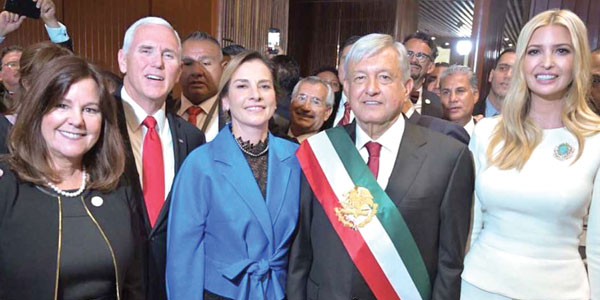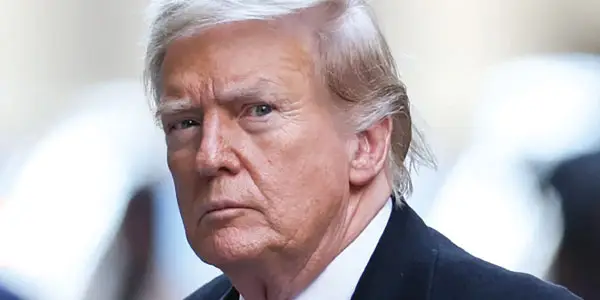
The new Mexican president, Andrés Manuel López Obrador, is under no illusions when it comes to President Donald Trump and race. He told me so in 2017 during an interview. This means that the honeymoon between AMLO, as López Obrador is known, and Trump might be a short one.
“Is Trump a racist?” I asked during our discussion.
“Yes, he is. He has said so,” López Obrador, who assumed the presidency on Dec. 1, told me. “He fuels racism. Indeed, he is against foreigners, but, actually, he doesn’t feel that way — it’s a political strategy.
“That is, let me clarify,” he went on. “His strategy, his xenophobia, his racism worked for him. That’s how he was elected. And the former administration didn’t know how to confront him.”
“Isn’t calling Trump a racist a bit bold?” I asked.
“Yes, but … “
“If you become president, this could cause huge problems,” I said.
“No, it doesn’t have to. I mean, we’ll be very clear about things,” AMLO said.
“You are saying that the president of the United States is a racist.”
“Because that’s how he treats us,” López Obrador said. “And he shouldn’t forget that Mexico is an independent nation.”
The question now is whether López Obrador will continue to be the same combative politician he was when he said these things — he actually published a book titled “Oye, Trump” (“Listen Up, Trump”) in 2017 — or whether he will just try to get along with the American president now that he is in office.
After the July election in Mexico, Trump congratulated AMLO, and both men have so far avoided a public confrontation over building a border wall. It’s a weird relationship: The new Latin American left and the American far right.
Sixty-four percent of Mexicans living in the United States voted for López Obrador when they mailed in their ballots. They expect AMLO to defend them from Trump; they don’t want him to leave them to fend for themselves, as former President Enrique Peña Nieto did.
Interestingly, Trump and AMLO have similar views on immigration. López Obrador wants to create good jobs in Mexico, believing it will prevent Mexicans from heading north; Trump is trying to prevent new immigrants from entering the United States from the south. Perhaps they both might work together with regard to what AMLO calls “cooperation for development.” Still, the arrival of the Central American caravans at the U.S. border is the first crisis the two presidents will face jointly.
But while AMLO has been critical of the American president, his harshness doesn’t extend to the leaders of Venezuela or Cuba.
“Do you believe Nicolás Maduro is a dictator?” I asked him in that 2017 interview.
“I’m not going to judge,” López Obrador replied.
“He has violated human rights and dissolved the national assembly. Dozens of people have been killed and many more have become political prisoners [in Venezuela],” I said.
“I don’t want to discuss that,” insisted AMLO.
“Why?”
“Because we have foreign policy principles: nonintervention and the right of people to self-determination.”
I changed the subject to Cuba.
“Can we say now that Raúl Castro is a dictator?” I asked.
“I wouldn’t call him that,” he answered.
“Mr. López Obrador, Cuba has been a dictatorship since 1959. Raúl was appointed by Fidel in 2008. You have denounced presidents who appoint their successors in Mexico. Why wouldn’t you complain about it in Cuba?”
“You have the right to ask all of those questions,” he told me. “I also have the right not to get involved in those matters.”
It is completely beyond belief that in 2018 a Latin American politician of López Obrador’s stature won’t dare label Cuba and Venezuela dictatorships. But this might simply be a practical issue, not a tacit acceptance of their ideologies. “Let them not mess with us,” he told me later, to sum it up.
It all seems to suggest that defending human rights in the Americas will not be one of López Obrador’s priorities. Inviting Maduro to his inauguration ceremony — and thereby undermining international efforts to isolate the Venezuelan dictator — sheds some light on AMLO’s approach: He will be focused on Mexico, not on being a leader in the hemisphere.
Mexico has taken a new course. The 89-year rule of the Mexico’s two primary political parties ended when Mexicans voted for a change. There are many things we still don’t know about López Obrador. But in the end, power will always reveal a leader’s true nature.
(P.S. You can watch my interview with López Obrador in Spanish here: bit.ly/2KpbrOI.)
El Mundo Según AMLO
El nuevo presidente de México, Andrés Manuel López Obrador, cree que el presidente Donald Trump es un “racista”. Así me lo dijo en una entrevista en el 2017. Eso quiere decir que la luna de miel entre López Obrador y Trump puede durar muy poco.
“¿Trump es racista?” le pregunté.
“Sí, sí. Él lo ha expresado”, me dijo López Obrador. “Azuza el racismo. Sí. Está en contra de los extranjeros, pero tampoco es que lo sienta así. Es una estrategia política. O sea, eso lo aclaro. Nos ha hecho mucho daño. A él le funcionó su estrategia, su xenofobia, su racismo. Así ganó, y no lo supieron enfrentar..
“Es fuerte que usted le llame racista a Trump”.
“Sí, pero…”
“Si usted llega a la presidencia, eso va a generar enormes problemas”.
“No, no tiene por qué. O sea, vamos a hablar con mucha claridad”, dijo López Obrador.
“Usted está llamando racista al Presidente de Estados Unidos”.
“Porque nos trata así. Y que no se olvide que México es un país independiente”.
La pregunta es si López Obrador, o AMLO, será el mismo político combativo que le llamó “racista” a Trump en mayo del año pasado — y que escribió un libro al respecto llamado “Oye Trump” — o si va a tratar de llevarse bien con el Presidente estadounidense. Trump felicitó a AMLO en un tuit, tras su triunfo en las elecciones de julio, y ambos han evitado pelearse públicamente por el asunto de la construcción del muro fronterizo. Es una relación extraña: la nueva izquierda latinoamericana con la ultra-derecha estadounidense.
El 64% de los mexicanos que vive en Estados Unidos y que votaron por correo en las pasadas elecciones en México lo hicieron por López Obrador. Y ellos esperan que los defienda frente a Trump y no los deje solos, como hizo Enrique Peña Nieto.
Pero lo interesante es que Trump y AMLO tienen una coincidencia sobre el tema migratorio. López Obrador quiere crear buenos trabajos en México para que los mexicanos no se tengan que ir al norte mientras que Trump está tratando de evitar que entren nuevos inmigrantes. Ahí se vislumbra una posibilidad de trabajar juntos en lo que AMLO llama “cooperación para el desarrollo”. Sin embargo, la llegada de las caravanas de centroamericanos a la frontera México-Estados Unidos es la primera crisis que enfrentan conjuntamente los dos mandatarios.
La dura visión de AMLO sobre Trump no se extiende a Venezuela y Cuba.
“¿Usted cree que Nicolás Maduro es un dictador?” le pregunté en la misma entrevista.
“No lo voy a juzgar”, me dijo.
“Hay violaciones a los derechos humanos, desmanteló la Asamblea. Hay decenas de muertos y de prisioneros políticos [en Venezuela]”.
“No quiero meterme en ese asunto”, insistió AMLO.
“¿Por qué?” le pregunté.
“Porque tenemos principios de política exterior: no intervención y autodeterminación de los pueblos”.
Luego pasé al tema de Cuba.
“¿Ya le podemos llamar a Raúl Castro dictador?” le pregunté.
“Yo no le llamaría así”, me respondió.
“Señor López Obrador, Cuba es una dictadura desde 1959. Él fue puesto por dedazo por Fidel en el 2008. Usted se quejó de los dedazos en México. ¿Por qué no quejarse del dedazo en Cuba?”
“Mira, esas fobias, yo creo que tú estás en tu papel de periodista. Tienes el derecho a preguntarme todas estas cosas. Yo también tengo el derecho a no engancharme con esos asuntos”.
Me parece totalmente inverosímil que un político latinoamericano de la talla de López Obrador no se atreva a decir en el 2018 que Cuba y Venezuela son dictaduras. Pero más que un compromiso tácito con sus ideologías podría ser, sencillamente, una cuestión práctica. “Que no se metan con nosotros”, me dijo más tarde, a manera de resumen.
Todo parece indicar que una de las prioridades de López Obrador no será el defender los derechos humanos en el continente americano. La invitación a Maduro a su toma de posesión — saboteando los esfuerzos internacionales para aislar diplomáticamente a la dictadura venezolana — demuestra el énfasis de AMLO: Será México y no como líder hemisférico.
Hay un nuevo rumbo en México. Terminan 89 años dominados por dos partidos (PRI y PAN). Los mexicanos votaron por un cambio y aquí lo tienen. Hay muchas cosas que todavía no sabemos sobre López Obrador. Pero el poder, al final, siempre desnuda.
(Posdata: Aquí pueden ver la entrevista con AMLO: bit.ly/2KpbrOI.)









